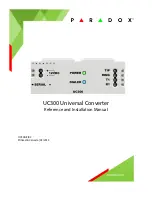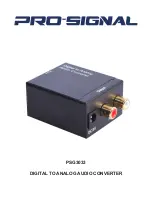
LED indicators
LED indicators serve as device monitoring and error display.
The following is the explanation for each LED indicator.
LEDs
State
Indication
On
TP/Fiber link connection established
Link/Act
Blinking
TP/Fiber transmitting or receiving data
On
Connection in full duplex mode
FDX
Off
Connection in half-duplex mode
PWR
On
Power on
1000
On
TP connection speed is 1000Mbps
100
On
TP connection speed is 100Mbps
Transmission characteristics of dual fiber converter
Dual
Fiber
Transmitting
optical
power
(dBm)
Receving
sensitivity
(dBm)
Transmission
distance
(km)
Loss
allowed
(dBm
)
MM/SC/
1310nm
-10
~
-5
-23
0.55
7
SM/SC/
1310nm
-9
~
-3
-24
20
11
SM/SC/
1310nm
-2
~ 3
-24
40
20
SM/SC/
1550nm
-3
~ 2
-24
60
19
SM/SC/
1550nm
-3
~ 2
-24
80
24
Transmission characteristics of single fiber converter
Single
Fiber
Transmitting
optical power
(dBm)
Receving
sensitivity
(dBm)
Transmission
distance
(km)
Loss
allowed
(dBm)
SM/SC/
1310/1550
-3 ~ -9
-24
20
SM/SC/
1310/1550
>
-4
-24
40
SM/SC/
1490/1550
>
-1
-24
60
Standard
loss:
1310nm-
0.4/km;
1550nm-
0.25/km;
1490nm-
0.25/km
Main feature
1. Built in high efficiency SRAM for packet buffer, with 1K
entry lookup table and 4-way associative hash algorithm
2. Half
-
duplex back
-
pressure and IEEE802.3x full duplex flow
control
3.
Auto MDI/MDI-X detection function on the TP port
4. Support link fault pass through function
5. Support far end fault function on the FX port
6. LED display for easy monitoring of device status
7. Transmission distance 550m multi-mode, 120km
single-mode
8. Low power consumption
Technical parameters
1. Standard: IEEE 802.3 10Base-T standard,
IEEE 802.3u 100Base-TX/FX standard,
IEEE 802.3ab 1000Base-T standard and
IEEE 802.3z 1000Base-FX
2. Protocol: CSMA/CD
3. Connector: one UTP RJ-45 connector, one SC/ST connector
4. Operation mode: full duplex mode or half-duplex mode
5.
Power consumption: 5V DC 1A (4.5W max.)
6. Operation temperature: 0
℃
- 55
(32
℃
˚
F - 131
˚
F)
7. Storage temperature: -20
℃
- 70
(
℃
-4
˚
F - 158
˚
F)
8.Relative humidity: 5%-90%
9. TP cable:
10Mbps - Category 3, 4, or 5 UTP
100Mbps - Category 5 UTP
1000Mbps - Category 5e or 6 UTP
10. FX cable: Multi-mode - 50/125, 62.5/125 or 100/140
µ
m
Single-mode - 8.3/125, 8.7/125, 9/125 or 10/125
µ
m
11. Dimensions: 94mm x 70mm x 26mm (3.7in x 2.8in x 1.0in)
Cautions:
1. This product is suitable for indoor application.
2. Put on the dust cover of fiber interface when not used.
3. It is forbidden to stare at the TX fiber-transfer end with naked eyes.
Troubleshooting:
1. Fail to transmit data: Make sure the UTP distance does not exceed
100m, and the fiber distance does not exceed the maximum
distance. Verify that both nodes are running at the same speed.
2.
UTP or Fiber Link LED is not lit: Check the power on the
network device connected to the converter, make sure it is
turned ON. Check the cables, make sure the UTP cable
complies with EIA/TIA 568 specification and fiber optic
cables comply with industry standards.
Technical Support
E-mail:
Website: www.linkskey.com




















